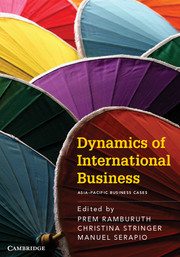Book contents
- Frontmatter
- Dedication
- Foreword
- Contents
- Contributors
- Preface
- Part I The Environment of International Business
- 1 AWB and the Iraqi Oil-for-Food scandal: Just a cost of doing business?
- 2 Walking the blurry line in China: Negotiating deals and staying out of jail
- 3 The feasibility of solar energy in el Junco
- 4 Colombian coffee: Issues of sustainability?
- 5 Preserving paradise: Shell’s sustainable development programs in the Philippines
- Part II Strategy and Entrepreneurship in International Business
- Part III Managing People in International Business
- Part IV Operating in International Markets
- References
2 - Walking the blurry line in China: Negotiating deals and staying out of jail
Published online by Cambridge University Press: 05 August 2013
- Frontmatter
- Dedication
- Foreword
- Contents
- Contributors
- Preface
- Part I The Environment of International Business
- 1 AWB and the Iraqi Oil-for-Food scandal: Just a cost of doing business?
- 2 Walking the blurry line in China: Negotiating deals and staying out of jail
- 3 The feasibility of solar energy in el Junco
- 4 Colombian coffee: Issues of sustainability?
- 5 Preserving paradise: Shell’s sustainable development programs in the Philippines
- Part II Strategy and Entrepreneurship in International Business
- Part III Managing People in International Business
- Part IV Operating in International Markets
- References
Summary
On Sunday, 5 July 2009, four Rio Tinto (Rio) staff who were engaged in selling and supplying iron ore to Chinese steel mills were arrested in Shanghai. The event made headline news in Australia, where Rio’s iron ore operations are headquartered, and across the globe. In November 2010, an eminent American expert on Chinese law noted that putting a rival in prison is an increasingly common tactic in business negotiations (Sydney Morning Herald 2009). Was the arrest and subsequent imprisonment of the four Rio staff a negotiation tactic by the Chinese because of the importance of the iron ore to the Chinese economy? Or did the four men who were found guilty of violating Chinese law knowingly cross the line from making guanxi (which means connections or relationships) payments to paying bribes? What lessons can foreign companies operating in China learn from the Rio Tinto case?
The four men described in this case are now in jail in China. They are Stern Hu, who was Rio’s manager in Shanghai and is Chinese-born with Australian citizenship, as well as Wang Yong, Liu Caikui and Ge Minqiang, all Chinese citizens.
Why were they jailed? Rumours and speculation
Initially, the four men were held without charge, and access was denied to Australian consular officials. The lack of access by both Australian officials and by Rio Tinto meant that until charges were laid on 12 August 2009, the rumour mill worked overtime. The men’s arrests were labelled a spy scandal.
There were suggestions that the arrest of the four men was ‘payback’ for Rio Tinto Board’s decision, on 5 June 2009, to scrap a strategic partnership with Chinalco (the Aluminium Corporation of China). Rio had been in discussions with Chinalco for months over a deal that would have seen Chinalco buy a stake in Rio’s iron ore, copper and aluminium assets. Newspaper articles suggested that Rio’s decision had caused a loss of face to the Chinese. China’s official news agency, Xinhua, said: ‘Rio Tinto is like a dishonourable woman: once she loved the money in Chinalco’s pocket but she actually did not love the man himself. Now she is breaking faith and kicking down the ladder.’ (Garnaut 2009a)
- Type
- Chapter
- Information
- Publisher: Cambridge University PressPrint publication year: 2013



